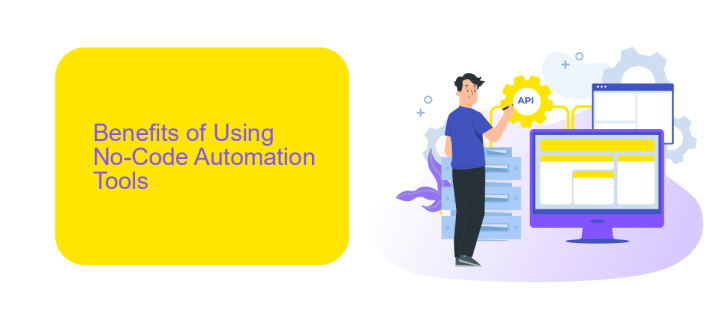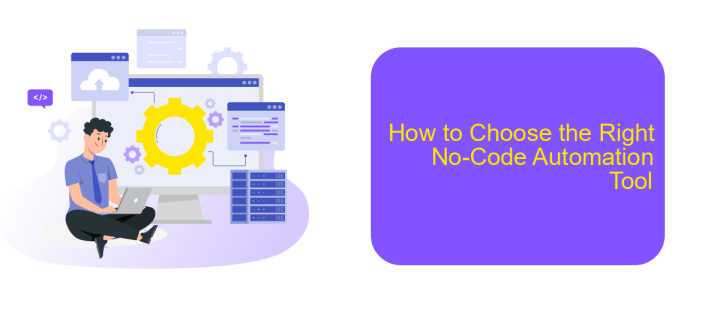No-Code Automation Tools
No-code automation tools are revolutionizing the way businesses streamline their operations. By eliminating the need for extensive programming knowledge, these tools empower users to automate repetitive tasks and workflows with ease. This democratization of technology not only boosts productivity but also enables teams to focus on more strategic initiatives, driving innovation and efficiency across various industries.
What are No-Code Automation Tools?
No-Code Automation Tools are platforms that allow users to automate workflows and processes without writing any code. These tools are designed to be user-friendly, enabling individuals with little to no technical expertise to streamline their tasks and improve efficiency.
- Drag-and-drop interface for easy workflow creation
- Pre-built templates for common automation scenarios
- Integration with various apps and services
- Real-time monitoring and reporting
One such tool is ApiX-Drive, which simplifies the integration of different applications without requiring any coding skills. By using ApiX-Drive, users can connect their favorite apps, automate data transfers, and manage workflows seamlessly. This empowers businesses to focus on growth and innovation rather than getting bogged down by repetitive tasks.
Benefits of Using No-Code Automation Tools

No-code automation tools offer significant benefits for businesses and individuals by simplifying complex processes and reducing the need for technical expertise. These tools enable users to create automated workflows without writing a single line of code, making automation accessible to non-developers. This democratization of technology allows teams to focus on strategic tasks rather than getting bogged down in repetitive manual work, thereby increasing productivity and efficiency.
Furthermore, no-code platforms often come with pre-built integrations that facilitate seamless data transfer between various applications. For instance, ApiX-Drive is a no-code tool that allows users to easily set up integrations between different software services, streamlining workflows and enhancing operational efficiency. By reducing the dependency on IT departments for automation and integration, businesses can accelerate their digital transformation and respond more swiftly to market changes.
Top No-Code Automation Tools

No-code automation tools have revolutionized the way businesses operate by allowing non-technical users to automate workflows and processes without writing a single line of code. These tools are designed to be user-friendly and can significantly enhance productivity and efficiency.
- Zapier: Connects your favorite apps and automates repetitive tasks with ease.
- Integromat: Provides advanced features for creating complex workflows and integrations.
- ApiX-Drive: Simplifies the process of setting up integrations between various services and applications, making it ideal for businesses looking to streamline operations.
- Automate.io: Allows you to integrate cloud applications and automate marketing, sales, and business processes.
- Microsoft Power Automate: Offers a robust platform for automating workflows across Microsoft and third-party services.
These no-code automation tools empower users to create seamless integrations and automate tasks, thus saving time and reducing human error. By leveraging solutions like ApiX-Drive, businesses can effortlessly connect various services, enhancing overall operational efficiency.
How to Choose the Right No-Code Automation Tool

Choosing the right no-code automation tool can significantly impact your workflow efficiency and productivity. The key is to identify your specific needs and evaluate tools based on those criteria. Start by understanding the tasks you want to automate and the level of complexity involved.
Next, consider the ease of use and user interface of the tool. A no-code platform should be intuitive and accessible, even for those without technical expertise. Additionally, check for integration capabilities with other tools and services you already use, such as ApiX-Drive, which simplifies the process of connecting various applications.
- Identify your automation needs
- Evaluate ease of use and user interface
- Check integration capabilities
- Consider scalability and future needs
- Review pricing and support options
Finally, take advantage of free trials and demos to test the tool in your environment. This hands-on experience will help you make an informed decision. Remember, the right no-code automation tool should not only meet your current requirements but also scale with your future business needs.
Best Practices for Implementing No-Code Automation
When implementing no-code automation tools, it’s crucial to start with a clear understanding of your business processes and objectives. Identify repetitive tasks that can be automated and prioritize them based on their impact on efficiency and productivity. Ensure that the chosen no-code platform is user-friendly and offers comprehensive support and documentation to assist you during the setup and troubleshooting phases.
Another best practice is to leverage integration services like ApiX-Drive to seamlessly connect various applications and automate workflows without any coding. ApiX-Drive provides an intuitive interface for setting up integrations, making it easier to synchronize data across different platforms. Regularly monitor and test your automated workflows to ensure they are functioning correctly and make adjustments as needed. Continuous optimization and staying updated with the latest features of your no-code tools will help you maximize their potential and achieve your automation goals effectively.
FAQ
What are No-Code Automation Tools?
How can No-Code Automation Tools benefit my business?
Can I integrate different applications using No-Code Automation Tools?
Is it difficult to set up No-Code Automation Tools?
Do I need technical skills to use No-Code Automation Tools?
Time is the most valuable resource in today's business realities. By eliminating the routine from work processes, you will get more opportunities to implement the most daring plans and ideas. Choose – you can continue to waste time, money and nerves on inefficient solutions, or you can use ApiX-Drive, automating work processes and achieving results with minimal investment of money, effort and human resources.

